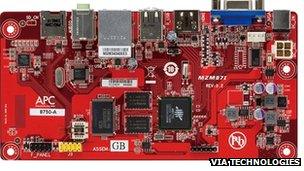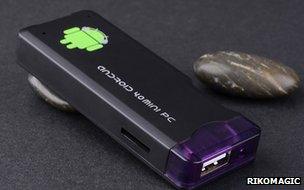Raspberry Pi faces challenge from Android-based rivals
- Published

Powered by a WonderMedia ARM processor, the APC offers an alternative to the Raspberry Pi
The Raspberry Pi computer faces fresh competition from two Asian micro-PC rivals.
Taiwan's Via Technologies has announced plans to sell the APC. Like the Pi it comes with its motherboard exposed and is designed to be connected to a TV or monitor.
It follows the MK802 - an enclosed PC-on-a-stick from China's Rikomagic - which went on sale last week.
Both new devices use Android, while the Pi runs GNU/Linux system software.
Some analysts believe that means the British-designed Pi machine will remain a favourite with educators.
"There's a much bigger amateur community writing code for the Linux system," said Paul O'Donovan, principal research analyst at Gartner.
"It's much easier to program on and therefore a better way to introduce people to the basics of writing software and experimenting with computers."
The Android-based devices will, however, benefit from the wealth of software available for Google's operating system - which itself is based on the Linux kernel.
<link> <caption>PCWorld reports</caption> <url href="http://www.pcworld.com/businesscenter/article/255837/this_tiny_pc_runs_linux_and_android_40and_costs_just_74.html" platform="highweb"/> </link> that the new machines should be able to be reconfigured to run Ubuntu, Debian and other varities of Linux software.
Pocket PCs
Via says the APC will be sold for $49 (£31) when it begins shipping in July.
It features 2GB of flash memory storage and runs an "optimised" version of Android 2.3. It measures 17cm by 8.5cm (6.7in by 3.3in)
The firm boasts that it only consumes up to 13.5 watts of power, a tenth of that consumed by a standard PC system.

Rikomagic's MK802 comes enclosed in a case and offers higher specifications than its rivals
By contrast, the MK802 is being advertised for $79, but offers higher specifications with 4GB of storage - upgradable to 32GB, as well as built-in wireless connectivity and the newer Android 4.0 system.
It measures 8.8cm by 3.5cm and is described as "the smallest volume Google TV player".
New market
The Raspberry Pi - which is advertised for $25 - remains the cheapest option. That reflects the fact that it is a not-for-profit project by a charitable foundation, as well as its reliance on separate SD cards for storage.
All three systems are based on chip designs by the low-power specialist ARM Holdings.
"System on chip designs can do an awful lot these days and we will probably see more of these devices coming out," said Mr O'Donovan,
"Memory, processors and connectivity slots have all become much cheaper.
"So these micro-PCs are inexpensive to make, and Chinese manufacturers are always looking to enter high-growth markets and secure sales even if their margins are low."
Others outside Asia are also trying to break into the nascent market.
Norway's FXI Technologies plans to release the USB-stick sized Cotton Candy PC later this year, while Intel plans to launch a new budget platform called "Next Unit of Computing" in the second half of the year.
Eben Upton, executive director of the Raspberry Pi Foundation, said it was keen to try out the competition.
"We definitely welcome the arrival of new devices like this in the market, and are looking forward to getting our hands on some units," he told the BBC.
"It will be interesting to see if they offer any performance advantage over the Pi to justify their higher price points."
- Published27 April 2012
- Published13 April 2012
- Published17 April 2012